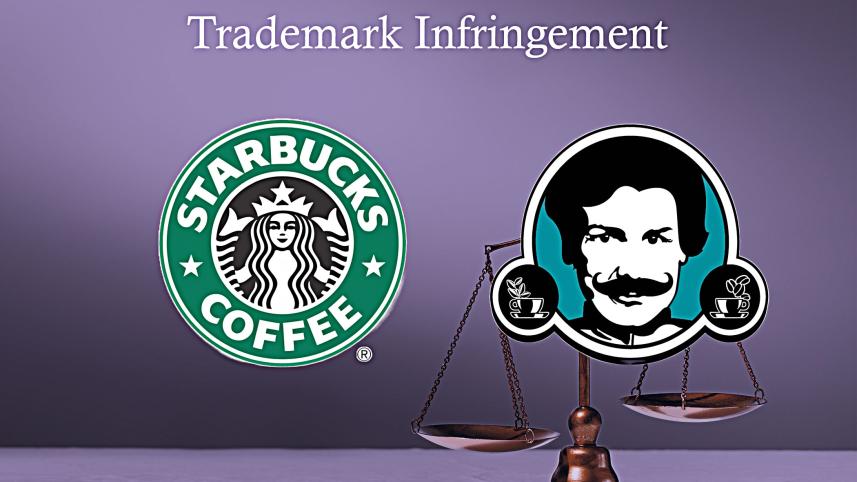Trademark law and the curious case of Sattar Buksh

Recently, a local café in Pakistan named Sattar Buksh, known for its branding, which resembled that of the global coffee giant Starbucks, has been making headlines for "winning a trademark battle" against the corporate giant. However, the dispute never actually made its way to court.
Starbucks Corporation, a globally recognised coffeehouse chain with thousands of branches worldwide, exists since 1971 and their distinctive green siren logo of the brand is globally recognisable as synonymous with coffee culture. But they have no branch in Pakistan. Sattar Buksh café, on the other hand, has been operational since 2013 in Karachi, Pakistan. The name and logo of the café – a round green logo containing a mustached man in place of Starbucks' mermaid - resembled Starbucks, though the founders contended that it was a satire with cultural elements, with their menu and identity being rather unique. Aside from their phonetic (name wise) and visual resemblance to Starbucks, they were known for their local, relatable, and humorous approach to food.
Starbucks objected to Sattar Buksh's name and visual similarity to its brand, issuing a cease-and-desist letter to them, citing that such resemblance will likely create confusion among the consumers regarding the origin of the services, dilute its famous trademark's distinctiveness and may potentially tarnish its reputation too. Section 86(3) of the Trade Marks Ordinance, 2001 of Pakistan allows the owner of a well-known trademark to seek restrain by injunction the use of a trademark in Pakistan which, or the essential part of which, is identical with or deceptively similar to their trademark, in relation to identical or similar goods or services, where the use is likely to confuse or where such use causes dilution of the distinctive quality of the well-known trademark.
If Sattar Buksh had not changed their logo and made the necessary changes, they could have possibly landed in legal complications, especially since the parody and cultural elements of their defence would hardly be valid under the trademark regime
In response to the action, Sattar Buksh, apart from justifying the cultural and parody-based side of their actions and clarifying that their name was from a 500-year-old Arabic source, made changes to their logo and also added a disclaimer to their Facebook page stating that they are not affiliated with Starbucks. Perhaps due to these adjustments, Starbucks has not opted to pursue litigation.
Although it is being hailed as a decisive win of local creativity and cultural expression over corporate dominance, the "alleged win" is perhaps owed to the steps taken by Sattar Buksh to make reasonable adjustments to its logo and make efforts to separate its identity from that of Starbucks.
Trademark anti-dilution protection, a concept originated in the German legal system and later adopted by other jurisdictions, is a legal mechanism to protect well-known brands from infringement of their trademarks. This protection applies to those infringements that blur the connection between brands, tarnish its reputation due to the difference in quality, or the violator relying on the trademark of the famous brand to sell its own goods. Article 6bis of the Paris Convention for the Protection of Industrial Property, 1883 and article 16 of the Agreement on Trade-Related Aspects of Intellectual Property Rights (TRIPS) contains protection for the "well-known marks." The Jordanian High Court of Justice in Amana v Adidas (2011) even went on to extend this protection when the opposing parties are dealing with non-competing goods and services. Similarly, in India, a café named Sardarbuksh Coffee was forced to change its name after Starbucks successfully established trademark infringement through deceptive similarity in the Delhi High Court. However, in the case of Starbucks Corporation v Wolfe's Borough Coffee, Inc. d/b/a Black Bear Micro Roastery, Starbucks failed to establish the claim of trademark dilution against a company, which marketed coffee named "Charbucks," due to weak similarity.
We can only argue what the outcome would have been if Sattar Buksh had been sued. But trademark dilution is a strong legal remedy in the hands of the owner of a well-known mark. If Sattar Buksh had not changed their logo and made the necessary changes, they could have possibly landed in legal complications, especially since the parody and cultural elements of their defence would hardly be valid under the trademark regime.
This case is important in our context as well since local businesses in Bangladesh often plagiarise the brand names and logos of famous brands. Sections 26(3) and (7) of the Trademarks Act, 2009 consider the use of a well-known mark an act of trademark infringement. As such, even giants such as Facebook and Adidas can sue local businesses in Bangladesh for using their names and logos in a deceptive manner.
The writer is lecturer (on study leave) at the School of Law, Chittagong Independent University.
 For all latest news, follow The Daily Star's Google News channel.
For all latest news, follow The Daily Star's Google News channel.
Comments